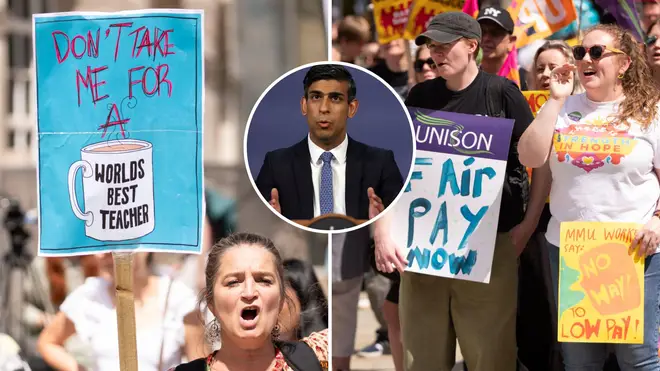
Lewis Goodall 10am - 12pm
13 July 2023, 15:11 | Updated: 13 July 2023, 15:13

Teachers’ unions have said they will back calling off industrial action and recommend their members accept a new pay offer from the government.
Teachers' union members have been urged to accept a new pay offer after Rishi Sunak announced on Thursday that teachers are to be offered a 6.5% pay increase.
The new offer was announced after the Prime Minister said he would accept recommendations from the government’s independent review bodies.
Dr Mary Bousted, the joint general secretary of the largest teaching union, the National Education Union (NEU), said this is the “biggest [pay rise] teachers have received since 2000.”
She attributed the victory to unions’ ongoing strike action, while adding that the offer was “properly funded” with an extra £500mil for school budgets for the rest of 2023 and £900mil for next year.
Dr Bousted added: “Importantly, the Government's offer is properly funded for schools. The Government has committed that all schools will receive additional funding above what was proposed in March, building on the additional £2 billion given to schools in the Autumn Statement.
"The Government will also provide a hardship fund of up to £40 million to support those schools facing the greatest financial challenges.”
The pay recommendations will “allow teachers and school leaders to call off strike action and resume normal relations with government,” she said in the joint statement with the government.

Despite the seeming triumph for teachers’ unions, how the government plans to fund the pay increase has been questioned.
At a press conference on Thursday, Mr Sunak said more than £1bil of the funds would be sourced by “significantly” raising fees on visa applications and access to the NHS for migrants.
A big chunk of the remaining funds will be found through “reprioritisation”, which is understood to refer to cuts from department budgets or trying to underspend, Rishi Sunak said.
The Prime Minister said the decision had been a difficult one, as it would “cost all of you as taxpayers more than we had budgeted for”.
“That’s why the decision has been difficult, and why it has taken time to decide the right course of action. I can confirm today that we are accepting the headline recommendations of the pay review bodies in full, but we will not fund them by borrowing more or increasing your taxes,” he said.
Earlier, Chancellor Jeremy Hunt said the Government would take "difficult but responsible" decisions on public sector pay.
He told MPs that "it is important to deliver on the Prime Minister's priority to get debt falling and to control borrowing to avoid adding inflationary pressures and risk prolonging higher inflation".
"That means taking difficult but responsible decisions on the public finances, including public sector pay, because more borrowing is itself inflationary," Mr Hunt said.
Police, NHS staff, junior doctors, prison officer and armed forces are also to benefit from the recent pay offer, which will vary between five and 7%.
Rishi Sunak said: “Today’s offer is final, there will be no more talks on pay. No amount of strikes will change this decision.”
The Government's has ruled extra borrowing to fund the pay increases, which could leave departments forced to find £3 billion from existing budgets.
ASCL, NAHT, NASUWT and NEU are now expected to put forward the deal to members with a recommendation to accept so teachers and school leaders are able to call of the strikes.